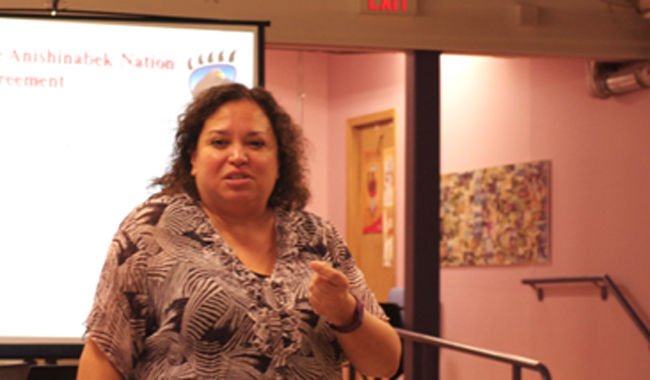Northern Superior communities getting ready to ratify education agreement in November

By Rick Garrick
The ratification process for the Anishinabek Nation Education Agreement was highlighted during Feb. 29 and March 1 information sessions in Fort William First Nation and Thunder Bay.
“For the Anishinabek First Nations, the benefits of ratifying this education agreement is that we (would) have full control over education and we could provide programs and services that better meets the needs of our students,” says Tracey O’Donnell, Anishinabek Education negotiations team member and Red Rock Indian Band citizen. “The whole goal of Anishinabek Education is to improve students’ success and support student well-being through culture, language and making sure First Nation citizens know who they are and know about their real history.”
The Fort William information session included a discussion about the number of yes votes that would be required for the Anishinabek Nation Education Agreement to be ratified. Two Fort William councillors, a number of band staff and an Elder participated in the Fort William session.
“We have to look at the total number of eligible voters — we need 25 per cent plus one of all the eligible voters to say yes, and the yes votes have to outnumber the no,” O’Donnell says. “So last night in our meeting with Fort William First Nation we were calculating what the number would be, and we worked that out to be about 188 yes votes.”
O’Donnell says Thunder Bay was selected as one of the urban centres to conduct meetings and share information on the Anishinabek Education System due to the number of Anishinabek citizens living and working in the area.
“We have some meetings coming up this week in the region — we’re going to Red Rock Indian Band, Pays Plat, Biigtigong Nishnaabeg (Pic River),” O’Donnell says on March 1. “We will be visiting Long Lake #58, Rocky Bay, Pic Mobert and Michipicoten (in April).”
Valerie Auger, a Kinoomaadziwin Education Body board member from Pays Plat, says the AES would provide more education funds to her community. The KEB Board of Directors were mandated in 2012 by the Anishinabek Nation Grand Council to oversee the establishment of the Anishinabek Education System.
“There are proposal driven dollars that we don’t get because we don’t have a school on reserve — all our kids go off-reserve for school,” Auger says. “And it would give me a little more clout with the school boards … with the curriculum development.”
The ratification process culminates with a one-week voting period from Nov. 28-Dec. 2, 2016. Polling stations will be open from 9 a.m. to 8 p.m. for three days on-reserve and two days off-reserve in urban centres. A mail-in ballot is also an option for eligible voters who cannot attend a polling station.
“We have 39 Anishinabek First Nations that are eligible to vote on this education self-government deal right now, but the agreement is drafted in such a way that if other First Nations in the province of Ontario are interested in joining, they could also become part of the self-government arrangement,” O’Donnell says.
In order to participate in the Anishinabek Nation Education Agreement, First Nations must develop a written constitution, ratify the template constitution or develop a draft constitution, and then ratify the constitution no later than the date it ratifies the Education Agreement. If a First Nation already has a ratified constitution in place, no new constitution needs to be developed.
Additional information about the AES, including upcoming meetings, AES infographics and contact information for the ratification coordinator and the four regional communications coordinators, is available online at: www.sayyestoaes.ca. The Anishinabek Nation began the AES negotiations about 23 years ago.


